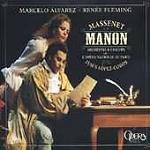Taped live at three performances (or a rehearsal or two?) in Paris in 2001, the drawing card here clearly is Renée Fleming’s Manon. For the most part her gorgeous, full sound is ideal for the character (see below), and she encompasses every note of the range, including the big, spot-on high-Ds in the Cours de la Reine and Gambling scenes. Her soft singing is meltingly beautiful–only occasionally do the mannerisms that lately have become so evident creep in (scooping into notes, a breathy delivery for emphasis).
Fleming’s first two acts are not as effective as the later ones. She doesn’t quite communicate Manon’s girlishness early on–it’s a nuance that eludes her, seemingly both vocally and emotionally–but her “Adieu, notre petite table” nonetheless is as lovely as can be. Beginning in Act 3, however, she’s gangbusters–she seems to relish showing off in the Gavotte, and no one could resist her advances the way she seduces Des Grieux in St Sulpice. Her death scene is moving as well. Beverly Sills recorded the role in 1970 and hers remains the benchmark reading. Victoria de los Angeles is glorious in her own way, and more recently, Angela Gheorghiu has been successful on disc. Fleming is not out of place in such company.
The true glory of this performance, however, is Marcello Alvarez’s Des Grieux. His voice is precisely the right timbre for the part, his French (like Fleming’s) is acceptable, and he seems to “get” this character instinctively. The boyishness in the first two acts, the dreadful regret/anger/weakness in the third, the wildness of the Gambling scene, and the tragedy of the last act are in his emotional palette. And the voice is simply golden. The top rings out, he softens his tone for all the tender moments (and doesn’t overdo the diminuendos in “Le reve”, even though he could), and he partners Fleming sensitively. He betters Gedda and Alagna in recorded performances of the role.
The rest of the all-French cast is excellent, with Jean-Luc Chaignaud nicely swaggering as Lescaut and Alain Vernhes imperious as Des Grieux père. The three “saucy” women’s roles are so mellifluously sung that their moments are less irritating than usual. Jesus Lopez-Cobos may not bring anything special to the opera, but he has a fine sense for the long score and he gives his singers plenty of breathing room while keeping things moving. The Paris orchestra and Chorus are excellent.
































